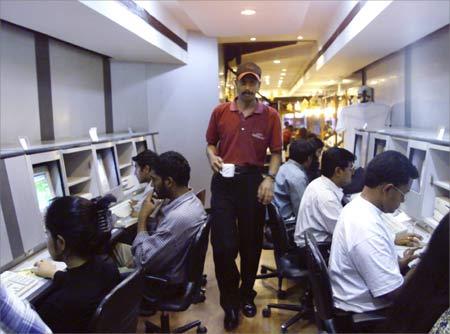 | « Back to article | Print this article |
'To be global giants Indian IT firms will have to shift gear'
"If you want to be a global giant, you cannot position yourself as only a software services provider; you have to be a solution provider," said Krishnamurthy Kothanda Raman, Eexecutive Director (Advisory Services), KPMG.
In an interview with Contributing Managing Editor Shobha Warrier, he also speaks about why most Indian companies have so far failed to make a mark in China.
Raman holds an engineering degree and is an MBA from the Indian Institute of Management, Bangalore, and has over 18 years of technology, management and consulting experience. Excerpts:
Recently you said that Indian companies do not register as much growth in China as vice versa. What are the reasons for this?
While China is a huge market for Indian IT companies, the same is true of Chinese IT majors as far as the Indian market is concerned. Indian companies have developed their China presence in the last few years to some extent but the actual build-up is somewhat lesser than a planned one.
Chinese companies in India have adopted an India-specific strategy. They have set up various R&D centres and tried to grasp how Indian companies do business here. Even when a Chinese heads the team at the CEO level, a large number of senior and middle management staff are from India. They deliberately appoint Indians to run the company, which helps them understand the local market and organisational system better.
But the same strategy has not been adopted by most Indian companies operating in China. While they could have hired a larger proportion of local management talent, they choose to appoint only Indians in the management team.
Secondly, Indian companies have failed to understand China's social and cultural set up. China is not a democracy, and there are language barriers and societal constraints. If they had Chinese managers at middle and senior level, they could have possibly handled these constraints well.
'Cultural barriers affect performance'
Indian companies basically adopted a wrong strategy?
The expansion plans of Indian companies in the Philippines or Brazil or Mexico or, say, even in Europe and the United States were fundamentally driven by the model they followed in India.
But in China or Japan, it cannot be that way. Other than the language and cultural differences, the way business management works in China is different from Indian or Western companies.
Cultural barriers affect performance. The way you motivate people and recognise their performance are fundamentally different there.
NIIT's China arm is reported to have been doing very well. What are the reasons behind its success?
As a policy, we don't comment on any one particular company. The kind of work training- oriented companies (like NIIT) do are different, and they tend to have beneficial tie-ups with the local government also.
If you have tie-ups with the government or associations in a foreign land, you are perceived as less of an outsider.
That might have been the reason why some companies are successful. They were possibly viewed as aiding the government to promote China on the global map.
'India and China cannot do without each other'
Do you see more Indian companies moving to China, and vice-versa?
Yes, it will happen. India and China cannot do without each other as they are two huge markets. They can complement each other too.
Bigger Indian companies will find it easy to move. Others who stand to benefit are those that are in the niche areas like engineering, design software, mobile value added services, etc. China, like India is a huge mobile market. So, you will have larger and niche players looking carefully at these markets.
Increasingly, the country of origin will become less important. You will have more Indian origin MNCs or Chinese origin MNCs but they will be no different from MNCs which are based in some western nation.
This strategy of globalisation is, however, different from an Indian company that is looking at expanding globally as an Indian company.
Do you feel that large Indian companies can repeat their performance in China also?
From the customer expansion prospective, Indian based MNCs need to have global foot print to convey confidence to customers that they have wider spread and can deliver seamlessly to global needs.
This is why Indian companies have to take China very seriously, and, needless to add that all the big players are taking it seriously.'China is fast catching up'
How do Chinese companies look at India?
A lot of them look at India as a huge market to serve and a country to learn from, particularly in the services sectors.
Will they be competitors to Indian companies in the long run?
Potentially, yes. In terms of language also, China is fast catching up. They have introduced English at the school level now. Some of the differences may be bridged in the coming years.
They can be a competitor in India also in the long term from a global market serving perspective as well. However it can also be a complementary presence. In the short term, however, India will continue its dominance in the IT services sector.
At present, India is concentrating only on services. Is it the right approach?
Not exactly. India needs to capitalise on its intellectual potential. It needs to focus more on product based and IP based business models.
When it happens, it will not be a dramatic shift from services. Services will continue to be India's strength but this time it will be more of knowledge asset leveraged services.
'Customer-end user relationship is very important now'
Indian software companies have not reached the level of say, a Microsoft or an IBM or an Oracle. Is it because they are concentrating mainly on services?
If you want to be a global giant, you cannot position yourself as only a software services provider; you have to be a solution provider. Indian companies used the earliest available business opportunities to grow which was naturally through services. Now, they have to shift gear.
Also, as far as products are concerned, you need to be closest to your customers. You also need to understand the domain and the market. That is why we do not have huge product development stories coming out of India.
Customer-end user relationship is very important now.
Are Indian companies satisfied with what they are doing right now?
Apparently, the perception is that they are reasonably satisfied with the growth story in the last decade. But things are changing dramatically thanks to the current downturn which has caused companies to take a critical internal and external look. They are, thus, making strategic plans to compete effectively.
'Outsourcing will continue'
Where do you see Indian and global software companies post-recession?
The large players will strive to remain dominant but as far as medium players are concerned, there could be possible consolidation.
I am convinced that Indian companies will now start thinking differently. From an India-based company serving the world, they need to think multinational. Impact of recession will be higher if they concentrate on one market alone. So, they need to diversify with respect to customers.
They also have to look at unexplored markets. At present, for most IT companies US comprise around 60 per cent of their market. It will remain the pre-eminent player in future also but not at this level.
Second is the choice of customers. Currently, they are looking at the Fortune 100 or Fortune 500 players. That may now have to change in favour of medium players.
With respect to sectors also, you will see a lot of churning -- like companies moving to other areas like healthcare, education and infrastructure management.
Will outsourcing continue the way it was earlier?
Yes. There is a positive outlook to outsourcing as a phenomenon. Outsourcing will continue. US has been the leader in outsourcing but other countries are picking up now, including Europe, Japan and Australia. There is a huge potential there.
There is a fundamental difference between outsourcing and off shoring. Outsourcing happens when companies do not want to do things within their companies. That is the first step. Off shoring happens when you give it to a company that operates from India, China or the Philippines to ensure optimum value from the spend.
'Indian companies will have to think global'
It is said that cost competiveness of Indian companies is going down. . .
That is why Indian companies will have to think global. Indian companies will have to operate from China or the Philippines or Brazil for cost competitive work. For higher value operations, they can work from India.
Offshoring as a general concept will happen more and more, and the Philippines could be a major competitor to India, for example, in operating call centres. For engineering services, China could be a major competitor. You will see Latin America serving the US and Canada more because of geographical closeness.
That means there will be multiple growth centres emerging soon. Indian companies can either look at it as different countries competing for work, or they can collaborate with them by setting up centres in those countries and tap local talent. It is like being a local player with global presence.
Does that mean boundaries are fading away?
Yes. The concept of nations and national boundaries will tend to get more and more blurred with increased interdependence.
Where do you see India in the global map in the next 5-10 years?
The huge domestic market and work force will act in favour of India. India can be a major player in the knowledge based services, in leading innovation for multiple industries because of the talent available in India.
Seventy per cent of the population is less than 30 years of age. This gives huge advantage to India in the next 30-40 years. If we keep our act together and make use of this formidable work force to serve the entire world, then, we would have done our job well.






